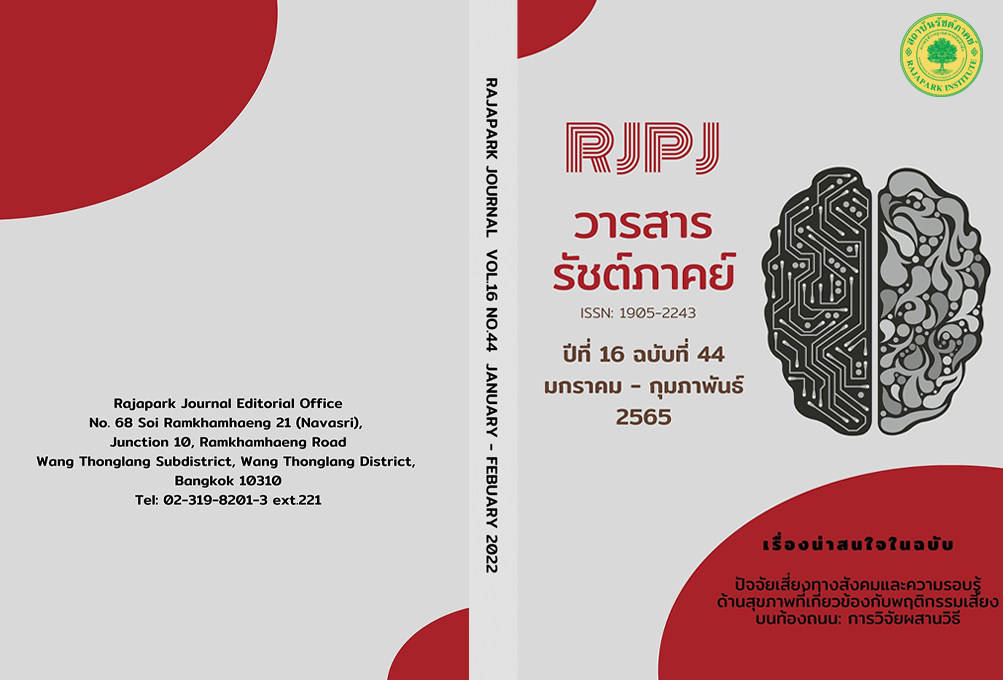The Model of Change for School Administrator, Nonthaburi Primary Educational Service Area Office 2
Main Article Content
Abstract
This research aims to 1) study the condition and guidelines of modern leadership of school administrators by using the query the sample group was 63 school directors. 2) The development of modern leadership of school administrators and check the quality of the pattern by using an interviewer model, including 5 educational experts and has made content analysis and 3) Trial and evaluate the form of modern leadership of school administrators by experimenting with 1 school administrators for 1 semester and the sample group in the assessment, namely 56 school directors. The research found that 1) Current condition of modern leadership of educational administrators the overall picture is practiced at a high level. 2) Model of modern leadership of the development of educational institutions that have been developed, consisting of 3 main components as follows: 1) Majesty 2) Mental and 3) Skills and 3) The results of the trial and evaluating the form of modern leadership of the school administrators, it was found that from the experiment to develop executives have skills and behaviors according to the pattern. Is at a high level and the results of the evaluation of modern leadership forms of developed educational institutions found that the overall picture is possible and the most useful level.
Article Details

This work is licensed under a Creative Commons Attribution-NonCommercial-NoDerivatives 4.0 International License.
Views and opinions appearing in the Journal it is the responsibility of the author of the article, and does not constitute the view and responsibility of the editorial team.
References
Amdonkloy, S. (2013). The Role of Educational Institutions in the 21st Century. Phitsanulok: Faculty of Education, Phibunsongkhram Rajabhat University.
Auareesuksakun, A., & Chantuk, T. (2016). Transformational Leadership: Changing Challenges to Achieve Organization Sustainability. Journal of Humanities, Social Sciences and Arts, Silpakorn University, 9(1), 845-853.
Boonchan, B. (2011). A Structural Equation Model of Technology Leadership for Basic School Administrators(Doctor of Philosophy). Khon Kaen University.
Cronbach, L. J. (1970). Essentials of Psychological Testing (3rd ed.). New York: Harper and Row.
Krejcie, R. V., & Morgan, D. W. (1970). Determining Sample Size for Research Activities. Educational and Psychological Measurement, 30(3), 607-610.
Kuhnert, K. W., & Lewis, P. (1987). Transactional and Transformational Leadership: A Constructive/Developmental. Academy of Management Review, 12(4), 648-657.
Likert, R. (1967). The human Organization: Its management and value. New York: McGraw-Hill.
The Office for National Education Standards and Quality Assessment (Public Organization). (2010). Basic Education Standards for Quality Assurance in Educational Institutions. Bangkok: The Office for National Education Standards and Quality Assessment (Public Organization).
Pato, S. (2009). A Model for Leadership of School Development Principals towards Professionalism under the Office of the Basic Education Commission. EAU Heritage Journal, 2(1), 99-109.
Phengsawat, W. (2006). The Structural Equation Modeling of Administrators’ Leadership Effectiveness in Influencing on the School Effectiveness(Doctor of Philosophy). Khon Kaen University.
Phesatcha, P., Markmee, K., Pongsriwat, S., & Nontapa, R. (2015). The Competency Development of Teacher Leadership on Information Technology and Communication in Learning Management the 21st Century. Journal of Graduate Studies, 12(59), 95-102.
Runcharoen, T. (2007). Professionalism in Educational Organization and Administration in the Era of Educational Reform. Bangkok: L.T. Press.
Thongmunee, P., Sikkhabandit, S., & Theerawitthayalert, P. (2020). A Modal of Leadership Development on Application of Technology for Police Cadets in Accordance with Thailand 4.0 Policy. Academic Journal of North Bangkok University, 9(1), 49-56.


